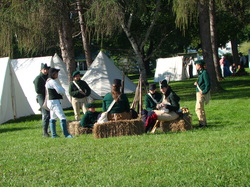Workshop Resources - Camp Life

Camp life and entertainment: suggestions for workshops: measure out on the grass the size of a barracks room and put 20 of the students in it - now imagine trying to put 20 bedrooms in it - could have a student demonstrate the size of his/her bedroom first, next - hold up a blanket and tell them about the married quarters (imagine having to do all your private activities with just a blanket for privacy from strangers and your own kids in the same room), point out the usual activities for an off duty soldier (cleaning, mending, or possibly a part-time job), include a description of the games and how one unfamiliar one is played.
Equipment: checkers (draughts) game, wooden dice, playing cards, yellow caution tape.
Websites:
-web site with instructions on Regency era (1812) games http://www.janeausten.co.uk/magazine/section.ihtml?id=73&step=2
background to Regency games http://www.janeausten.co.uk/magazine/page.ihtml?pid=763&step=4
article on soldier’s families http://www.warof1812.ca/family.htm
Camp life and entertainment: notes
-drill,fatigues (camp chores, etc) and duty occupied almost all the time; hard to keep their uniform clean, there would be some limited time off that some soldiers would use for moonlighting to gain money (both armies)
-low average for US troops was 1/8 of men sick in camp at one time, could be higher and was rarely lower
-British army soldiers were allowed 6 wives per regiment (for non-officers), wives would draw slips of paper which would have “not to go” on it; official wives received rations (the 6); camp women were also under military discipline, if her husband died she had to immediately remarry to keep her status as a regimental wife; official wives would do washing, mending, cooking, and would search the battlefields for wounded husbands
-in US, typical fort had 20 enlisted men living in 1 barracks room with a single fireplace and wood bunks with staw mattresses which slept 4 to 6 men each, had other simple furniture, junior officers got a room each while seniors got more than 1 room; officers families would come with them but men discouraged from marrying
-do drill, sentry duty, cleaning, light labour
-each US company allowed to have 4 laundresses who were sometimes the soldier's wives
-British barracks also had 20 men to a room seldom more than 7 feet tall and 30-32 feet long by 20 feet wide; each bed or 'crib' had 4 men and they slept on smelly straw and with a few threadbare blankets and a lot of body odour, urinals were wooden buckets and feces were deposited in pits; some of the men were married so sections of the barracks room would be partitioned by blankets, children born there
-no recreation provided in the barracks
-often tents were not available so soldiers make temporary shelters from branches, straw, etc
-playing cards was popular with all ages and classes; games included Whist, Loo, Canasta, Piquet, and Speculation
-middle and upper class British and more classes in American society would write letters and read (notable that American regulations forbid reading during sentry duty for soldiers but British regulations did not – which presumes less reading by the poorer British classes
Equipment: checkers (draughts) game, wooden dice, playing cards, yellow caution tape.
Websites:
-web site with instructions on Regency era (1812) games http://www.janeausten.co.uk/magazine/section.ihtml?id=73&step=2
background to Regency games http://www.janeausten.co.uk/magazine/page.ihtml?pid=763&step=4
article on soldier’s families http://www.warof1812.ca/family.htm
Camp life and entertainment: notes
-drill,fatigues (camp chores, etc) and duty occupied almost all the time; hard to keep their uniform clean, there would be some limited time off that some soldiers would use for moonlighting to gain money (both armies)
-low average for US troops was 1/8 of men sick in camp at one time, could be higher and was rarely lower
-British army soldiers were allowed 6 wives per regiment (for non-officers), wives would draw slips of paper which would have “not to go” on it; official wives received rations (the 6); camp women were also under military discipline, if her husband died she had to immediately remarry to keep her status as a regimental wife; official wives would do washing, mending, cooking, and would search the battlefields for wounded husbands
-in US, typical fort had 20 enlisted men living in 1 barracks room with a single fireplace and wood bunks with staw mattresses which slept 4 to 6 men each, had other simple furniture, junior officers got a room each while seniors got more than 1 room; officers families would come with them but men discouraged from marrying
-do drill, sentry duty, cleaning, light labour
-each US company allowed to have 4 laundresses who were sometimes the soldier's wives
-British barracks also had 20 men to a room seldom more than 7 feet tall and 30-32 feet long by 20 feet wide; each bed or 'crib' had 4 men and they slept on smelly straw and with a few threadbare blankets and a lot of body odour, urinals were wooden buckets and feces were deposited in pits; some of the men were married so sections of the barracks room would be partitioned by blankets, children born there
-no recreation provided in the barracks
-often tents were not available so soldiers make temporary shelters from branches, straw, etc
-playing cards was popular with all ages and classes; games included Whist, Loo, Canasta, Piquet, and Speculation
-middle and upper class British and more classes in American society would write letters and read (notable that American regulations forbid reading during sentry duty for soldiers but British regulations did not – which presumes less reading by the poorer British classes